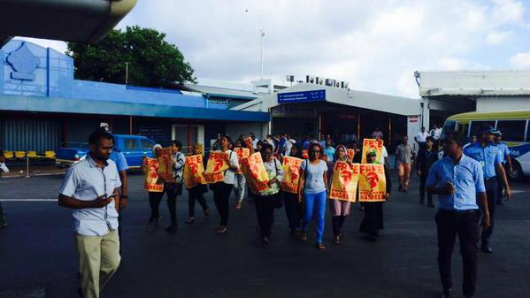Former President Mohamed Nasheed has called for new leadership within the Maldivian Democratic Party (MDP) following defeat in what he described as an “unfair” but accepted parliamentary election.
“I request new people to come and run the party,” Nasheed told the media today.
The party’s figurehead said he will continue to serve the party in the future and hopes that members of the party would make clear his role.
“I want new people to come forward to run the party. But I will not go away from the party, I will always remain in doing party work,” he added.
Nasheed, a co-founder of MDP and it’s first chairperson, was elected as the President of Maldives in the first democratic election in 2008.
The position of both president and vice president of the party remain vacant after party president Dr Ibrahim Didi and VP Alhan Fahmy were removed in a no-confidence vote in April 2012. Nasheed said today that a new party president should be elected soon.
“It is important for the party to restructure with these new results and with new people and go forward fast,“ he said.
Commenting on the ruling Progressive Party of Maldives’ (PPM) comments about reforming the MDP, Nasheed said that the work done by all parties in the Maldives needed reform.
“If PPM says that, it should be an inspiration for us. I believe when parties tell each other to strengthen their functioning, it must be accepted,” Nasheed said.
The function of holding the government accountable would be difficult without a majority, he noted, but it would still be carried out by the MDP in other forms such as questioning state institutions and bringing issues to the attention of the public.
“We did hope for a majority. I was hoping for around 45 seats. Not winning the election was a great loss for us. But I don’t think the result is such a loss that we should be so worried that we stop our work and become weak.”
“The MDP will remain as a big party, will hold rallies, give speeches, take trips, will say whatever has to be said politically at anytime. The MDP will protest, MDP will raise their voice over issues. MDP will carry out peaceful political activity?” Nasheed continued.
An official party statement issued today said that the party hopes its members will remain in reforming the country, and assured that the elected candidates of the party will remain in “preventing the country from going off track” and in reforming the judiciary.
“The MDP will always go forward in the path shown by the members and supporters of the party, in ways which are most beneficial for the country,” the MDP press statement read.
Parliamentary Elections
The reasons for losing the election previously suggested by members of the MDP leadership were echoed by Nasheed today
He said the defeat was a result of multiple factors, including undue influence, fear, money, candidates, policies, campaign budget shortages, and a lack of confidence in the election.
Nasheed suggested that expelling employees from companies with government shares and government positions also had a negative impact on the results.
“The voter turnout was very low in many areas. I believe among these reasons are removing Elections Commission members, and lack of confidence in the election from the members of the public,” Nasheed said.
Criticising the Supreme Court’sremoval of the Elections Commission (EC) president and vice president a few days ahead of the parliamentary elections, Nasheed said that such an election will be “very difficult to be considered fair”.
He said that it was a display of power to the public and it resulted in a low voter turnout, as many people believed the election would not make a difference.
“We believe this is not a fair transparent election because of that. I am not saying that things didn’t go well on election day. I’m not saying that we don’t generally accept the election.”
He also noted that the leadership of any party and the those involved in it should take responsibility for the victories and losses.
Commenting on the leadership’s responsibility for the defeat, Nasheed said that negligence of leaders should be accepted when faced with a failure, but that there had been no such negligence to a level which required going into detail and pointing fingers.
Congratulating President Abdulla Yameen for achieving “a great victory”, Nasheed called on him to lead and work with the MDP in reforming the judiciary and sustaining the democratic system.
“We hope that our members will do substantial work in the parliament as an opposition party. We believe there is a lot of work that has to be done through the People’s Majlis.”
“I hope the government will use their parliament majority with care, that they will not take our members to court, and that these members will not have to face extraordinary obstacles.”
Likes (0)Dislikes
(0)Dislikes (0)
(0) 
